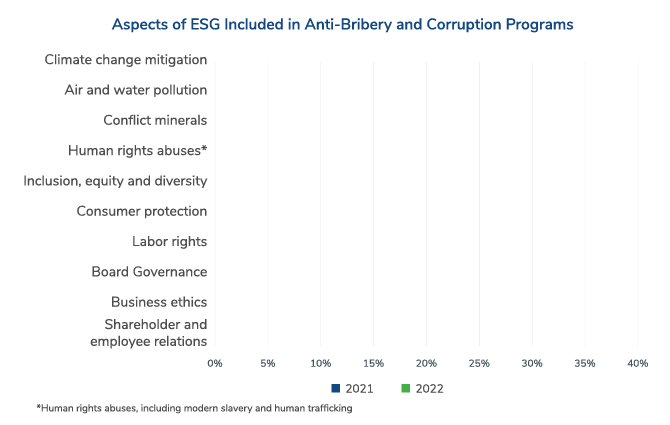Anti-Bribery and Corruption Programs, Blockchain and Crypto: Who and Why?
by Veronique Foulon

Mon, Jun 6, 2022

Kroll’s 2022 Anti-Bribery and Corruption Benchmarking Report, the result of a survey of 700 executives conducted earlier this year across the globe, offers thoughtful insights into the state of anti-bribery and corruption (ABC) programs worldwide for the 11th consecutive year.
We entered 2022 with the second anniversary of the pandemic, continued supply chain shocks, economic and geopolitical anxieties, and a lull in ABC enforcement activity. In these conditions, it was vital to assess the strengths, weaknesses and emerging trends within ABC programs across the globe. A better understanding of the state of ABC programs became even more important with the outbreak of war in late February and the resulting unprecedented coordination between governments to impose sanctions on Russia. Our survey found that despite these challenges and uncertainties, companies on average continue to be confident in the efficacy of their ABC programs and seek innovative ways to bolster their defenses.
This year’s survey further examines these innovations, including the uneven adoption of distributed ledger technology in ABC programs. And given the rapidly shifting views on incorporating environmental, social, and governance into ABC programs last year, we investigate the progress made to date and what is left to be done.
Also, for this year, 14 countries were represented in our survey, with 50 participants hailing from each one, including Australia, Hong Kong SAR, Greater China, Singapore, France, Germany, Italy, the United Kingdom, Brazil, Mexico, Saudi Arabia, the United Arab Emirates, Canada and the United States. Based on respondent insights, this report individually analyzes results at a macro and micro level, demonstrating a broad spectrum of diverse geographies and challenges.
Other key findings include a high level of agreement that the compliance function will take on more responsibilities in 2022, although compliance leaders feel supported. Respondents who believed their compliance programs are effective attributed this confidence to internal audits and third-party program reviews that confirm their programs work and to a lack of bribery incidents reported to date.
Thank you for spending time to review these results, and as always, Kroll is available to further discuss the details of these findings and to collaborate with you in improving your ABC compliance, readiness and program objectives.

Blockchain and cryptocurrency (crypto), closely related within the ‘distributed ledger technology’ space, are gradually impacting data exchange and transactions globally. Kroll’s 2022 Anti-Bribery and Corruption (ABC) survey responses highlighted that some jurisdictions are drawn to blockchain and crypto more than others, with an understanding of its potential for ABC Programs and compliance management. Events that saw extreme regimes establish new channels for funneling funds outside of the traditional payments systems due to sanctions and lack of infrastructure have led to new ABC and KYC challenges in relation to crypto. Our experts detail the reasons for an uneven adoption of the blockchain technology and its correlated crypto application in an increasingly powerful and global-reaching financial network.
In 2022, 48% of the respondents stated their firms boosted their ABC programs with greater consideration for all the key aspects of the ‘E’, ‘S’ and ‘G’ of ESG compliance. Of increased importance were factors related to air and water pollution, labor rights, climate change mitigation, human rights abuses and diversity, equity and inclusion (DEI) matters. Yet 2022 respondents reaffirmed the challenges ESG brings to the compliance function, including limited data and a lack of standardization, transparency, regulation and cost when it comes to due diligence.


The majority of 2022 survey respondents have concern with the regulatory future. Are they expecting a specific law to change ABC enforcement, or are they concerned with the unknown? Although the multilateral coordination between governments on sanctions early in the year was a surprise for many and could be a precursor for future joint efforts to combat corruption, it may lead to additional complexity for the compliance function. Regardless of how the next 12 months unfold, companies will need to maintain their confidence in and support of ABC compliance to face ongoing and new risks to their organizations.
In a post-pandemic work environment, the key question remains: Which business challenges, risks and opportunities will change anti-bribery and corruption programs long term? As we come out of the pandemic, organizations must adopt lessons learned from the greater use of remote monitoring of third-party relationships and remote trainings, as well as maintain their focus on identifying and addressing emerging risks in their supply chains. Environmental, social and governance (ESG) and anti-bribery and corruption (ABC) compliance will continue to converge because of their shared opportunities for good governance, as well as the growing calls for standardization, transparency and regulation.
When we look back on 2022, our hope is that the year is a pivotal moment for the compliance function in several ways, not only for how multilateral sanctions are used but also a renewed focus for governments and societies in the fight against corruption. The challenge of expecting private companies to enforce sanctions presents an opportunity to improve corporate data and drive greater transparency that ultimately will deliver accountability in the corporate environment for many of our clients. Additionally, with the increasing emergence of blockchain technologies in ABC programs, the road toward compliance resilience and transparency is potentially optimistic and achievable.
During this time of ongoing change, the role of the compliance function to safeguard their organizations against risk has never been more vitally important to all those who are responsible for regulatory requirements around the globe.
Complying with anti-money laundering and anti-bribery and corruption regulations.
Comprehensive spectrum of background checks, screening and due diligence services.
Supporting corporate third-party management programs to drive risk-based due diligence decisions.
Kroll helps clients navigate the complexities of today’s regulatory environment through a broad suite of anti-money laundering compliance screening and due diligence offers.
Identifying, assessing, mitigating and monitoring third-party risk in modern supply chains
Kroll is trusted by companies worldwide to help establish policies and programs aimed toward preventing fraud and complying with anti-money laundering (AML) and anti-bribery and corruption regulations.
Kroll helps clients mitigate and respond to the risks associated with international anti-corruption legislation.
Kroll’s anti-money laundering (AML) solutions are designed to help minimize the risks associated with money laundering and other illicit activities and to ensure compliance through the development and management of ongoing compliance programs and processes.
by Veronique Foulon

by Elisabetta Lanzilao, Nilufar Kuchimova, Nathalia Cantanhede

by Michael Watt

by Joshua Haber, Alina Laumann

by Michael Watt, Emanuel Batista

by Veronique Foulon

by Anastasia Smiley, Nicholas Beaton, Brenton Dsouza



On June 22, 2022, Kroll experts shared findings from the 2022 Anti-Bribery and Corruption Benchmarking Report and dove deep into the insights on the current ABC landscape, including trends for the upcoming year and the critical challenges faced by compliance officers.